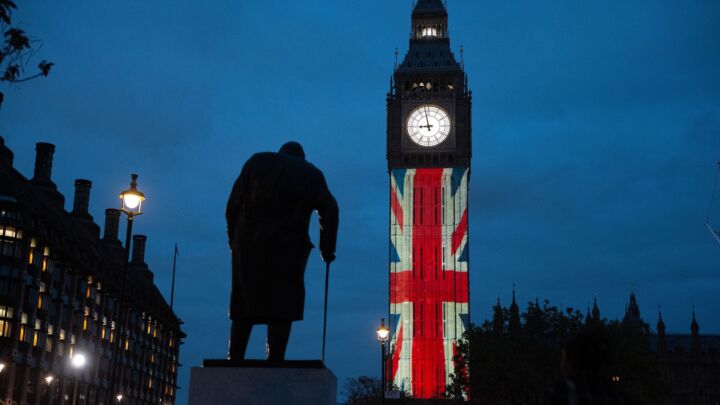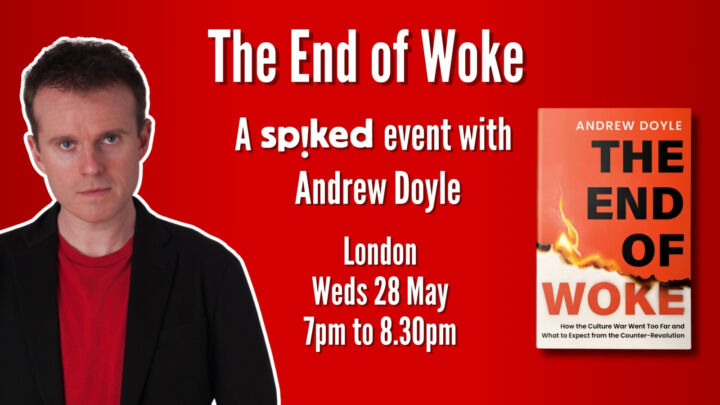UK capitalism: ‘Plan B’? A Plan A might be a start
Britain's Tory chancellor basks in worthless IMF approval, yet neither his government nor the opposition has an idea beyond A for Austerity.

Want to read spiked ad-free? Become a spiked supporter.
There has been much smugness in British government and media circles over the International Monetary Fund (IMF) endorsement of the Lib-Con coalition’s strategy for cutting public spending to reduce the deficit. Despite the problems of stagnating growth, rising inflation and persistent mass unemployment, the IMF has broadly endorsed Tory chancellor George Osborne’s approach and dismissed the calls from Labour politicians and left-leaning economists for an alternative ‘Plan B’ to kickstart the recovery. For some reason, this predictable outcome proved a disappointment to government critics who had pinned their hopes on the IMF adding to the pressure on Osborne to reconsider the extent and speed of the cuts.
But it is hard to see why anybody should imagine that the British government could come up with a Plan B, when the Tories and Liberal Democrats clearly do not even have a Plan A for economic recovery between them. And neither, for that matter, does the Labour opposition. Unless, of course, the A stands for ‘Austerity’, since that is all that the major parties have to offer today, whether it is the relatively fast-track austerity of Osborne and Co, or what one economics editor calls the ‘slowing down of austerity’ demanded by Labour and a long list of opposition economists. That’s not exactly fighting talk where anybody comes from. ‘What do we want? The slowing down of austerity! When do we want it? Within the lifetime of the current parliament!’
Despite all the apparently heated debate about the exact timing and extent of the cuts, austerity is not a plan or a programme. It is an exercise in bailing out the boat to keep it afloat, one which gives no clue as to how the creaking old economic vessel might be repaired and updated in order to steam ahead into the future.
The IMF might be certain that Osborne is the man with the plan. Yet why would even hardened capitalists take their forecasts too seriously? It was the IMF, after all, which in March 2007 heaped praise on the British economy’s ‘impressive’ performance under New Labour and upped its forecast for UK growth, while warning that interest rates – then at 5.25 per cent – might need to rise higher to curb wage demands. Such paeans helped pave the way for then-chancellor Gordon Brown’s coronation as prime minister a couple of months later, taking over from Tony Blair. Then came the international financial crisis, entirely unforeseen by the IMF’s wise men, the collapse of the banks, the slashing of interest rates to 0.5 per cent, and the fall of New Labour, as the same experts queued to blame the ‘impressive’ Blair-Brown strategy for all Britain’s ills. Now the IMF says Osborne has got it right. But what do they know?
The capitalist class has always had difficulty understanding the real workings of its own system, making do with mystical talk about the ‘hidden hand of the market’ and how ‘money makes the world go round’. Things are even worse in today’s messed-up world of finance-centred capital, where nobody truly seems to understand what is happening in the financial markets or who owes how much to whom. It is hard to see why anybody with a memory longer than three years would think IMF forecasts worth the web pages they are published on.
Which makes it all the more bizarre that the government’s opponents seemed disappointed this week, having apparently put their faith in the IMF to do their job for them and win the argument against the Tories. The International Monetary Fund is supposed to be a keeper of the purse and the books for global capitalism. In the 1970s, it forced Britain’s Labour government to go cap in hand for aid, and imposed harsh penalties on the British economy. Since then the IMF has often played the role of pantomime villain for those looking for an easy symbol of faceless capitalist power. Today its priority is to demand big spending cuts from economies in dire straits such as Greece and Portugal.
So why would anybody expect the IMF bureaucrats suddenly to turn into anti-Tory campaigners and endorse the demand for a Plan B? It is a sign of how little they have to offer themselves that many leftists who are normally critical of the IMF apparently hoped it would don the white hat on their behalf this time. Just as it is a sign of social democracy’s loss of faith in its own politics and nations that leading lights such as the fallen French Socialist leader DSK and former New Labour premier Brown seem to believe that fronting a global capitalist institution such as the IMF now offers their best chance of changing the world.
Beneath the nonsense headlines and rows about the non-existence or otherwise of a Plan B, the reality remains that no side has any real Plan A for a new British economy. The coalition government has focused on starting to cut the budget deficit – without dramatic success so far – while hoping that Britain’s weak manufacturing and other exporters would somehow step forward heroically to fill the gap, and that consumers would somehow prove stupid enough to keep spending more despite the squeeze on incomes. New Labour’s ‘plan’ is much the same, with a slightly longer timescale. The result is that even the sympathetic IMF has had to downgrade its forecast for British economic growth – again. It now expects to see growth of a mere 1.5 per cent this year, down from 1.7 per cent two months ago, and two per cent last autumn. The question now is less whether there will be a dreaded double-dip recession, more whether this low/no growth economy is becoming the new normal.
The absence of any serious debate about alternatives in the middle of a crisis represents a failure of the elite’s political and social imagination. That, in turn, reflects the dead end at which stagnant Western capitalism has arrived. As the banking bailouts, Euro bailouts and other desperate measures have demonstrated, there is no such thing as a free market and the system cannot survive without being propped up by state and institutional interventions; even Osborne has this week had to admit that there may be limits to cuts in state spending. But at the same time there is little new that conventional state spending can do to inject dynamism into over-mature economies – the US economy is also stumbling, despite President Obama’s resistance to spending cuts. All they can come up with is more tinkering at the edges, such as the IMF’s ‘radical’ suggestion that some tax reductions for Britain’s poorest might help somewhere down the line.
Despite the IMF’s false optimism, the British economy remains in a particularly parlous long-term state. The peculiar drivers behind the false-bottomed ‘boom’ of the previous decade – public spending, consumer credit, and the credit-fuelled inflation of paper asset prices, from homes to shares – can no longer drive the economy anywhere. There is a pressing need to open up a fundamental discussion about creating a new economy – one that begins from the acknowledgement that there can be no going back to the past, that recognises we need a proper economy rather than a housing market, and is prepared to question everything about both the market and state intervention; and that will have to involve a debate about the future of welfare and work which goes way beyond an accountant’s obsession with cuts.
Instead, all the leaders of today can do is hang on to as much of the old economy as possible and hope for the best, while reducing debate to bickering about the timing of cuts. So no, there is no Plan B. We are left with Plan A for austerity, possibly backed up by Plans C for Cross-your-fingers, D for Delusion, E for Evasion and F for Fantasy economics.
Mick Hume is editor-at-large of spiked.
Who funds spiked? You do
We are funded by you. And in this era of cancel culture and advertiser boycotts, we rely on your donations more than ever. Seventy per cent of our revenue comes from our readers’ donations – the vast majority giving just £5 per month. If you make a regular donation – of £5 a month or £50 a year – you can become a and enjoy:
–Ad-free reading
–Exclusive events
–Access to our comments section
It’s the best way to keep spiked going – and growing. Thank you!








Comments
Want to join the conversation?
Only spiked supporters and patrons, who donate regularly to us, can comment on our articles.